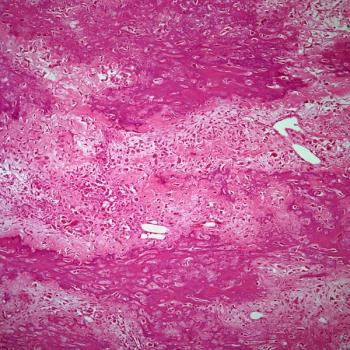
Further research may be needed to help determine the underlying mechanisms of polybrominated diphenyl ether exposure contributing to the risk of cancer-related mortality.

Your AI-Trained Oncology Knowledge Connection!


Russ Conroy is an Associate Editor for CancerNetwork. He grew up in Hillsborough, New Jersey, and graduated from Rutgers University-New Brunswick in 2022.
On the weekends, he likes to unwind by playing video games with friends, tailgating at Rutgers football games with his family, or building his music collection with a visit to Princeton Record Exchange.

Further research may be needed to help determine the underlying mechanisms of polybrominated diphenyl ether exposure contributing to the risk of cancer-related mortality.

MK-1084 previously demonstrated manageable safety and preliminary activity in non–small cell lung cancer harboring KRAS G12C mutations as part of a phase 1 trial.

Enfortumab vedotin plus pembrolizumab appears to reduce the risk of disease progression or death vs chemotherapy in locally advanced or metastatic urothelial carcinoma.

Data from the phase 3 COMMANDS trial support the expanded European approval of frontline luspatercept for transfusion-dependent anemia in lower-risk myelodysplastic syndromes.

If possible, targeting the BER pathway for drug sensitivities may increase therapeutic options for managing solid cancers, wrote Channing Paller, MD.

Long-term circulating tumor DNA responses appear to align with progression-free survival trends in a phase 2/3 trial of the GRANITE vaccine in those with microsatellite-stable colorectal cancer.

Data from the phase 3 TROPION-Breast01 trial support the biologics license application for datopotamab deruxtecan in hormone receptor–positive, HER2-negative breast cancer.

The characteristics of rare earth ceramics may yield more consistent microwave energy penetration during the treatment of those with thyroid nodules.

Findings from the phase 2 SPEARHEAD-1 trial demonstrate how T-cell receptor therapy may effectively target solid tumors.

An updated guideline from ASCO highlights appropriate use of vaccines for patients with cancer receiving treatments such as CAR T-cell therapy or B-cell depleting therapy.

Investigators will evaluate the preliminary efficacy and safety of NST-628 in adult patients with solid tumors harboring mutations in the RAS-MAPK pathway as part of a phase 1 trial.

Data from the phase 3 EV-302 trial support an application for enfortumab vedotin plus pembrolizumab as a treatment for patients with advanced bladder cancer in China.

Treatment with adagrasib in the phase 3 KRYSTAL-12 trial raised no new safety signals among patients with KRAS G12C–mutated non–small cell lung cancer.

Findings from the phase 3 CAPItello-291 trial support the approval of capivasertib/fulvestrant for patients with hormone receptor–positive, HER2-negative breast cancer in Japan.

Data from the phase 3 KEYNOTE-671 trial support the European Commission’s approval of pembrolizumab plus chemotherapy for those with resectable non–small cell lung cancer.

Data from the phase 2 AUGMENT-101 trial support the biologics license application for revumenib in patients with relapsed/refractory KMT2A-rearranged acute leukemia.

Investigators will assess the PRE-ACT tool’s ability to predict adverse effects such as skin and heart damage in a phase 3 trial.

Intracranial disease control with Ivonescimab plus chemotherapy appears encouraging in patients with non–small cell lung cancer and brain metastases.

The agency submits complete response letters based on the enrollment status of confirmatory trials for odronextamab in follicular lymphoma and diffuse large B-cell lymphoma.

The positive opinion is supported by findings from the phase 3 EMBARK trial assessing enzalutamide in patients with biochemically recurrent prostate cancer.

Data from the phase 3 MIRASOL trial support the full FDA approval of mirvetuximab soravtansine for those with folate receptor alpha–positive platinum-resistant ovarian cancer.

Treatment with osimertinib plus chemotherapy also shows a consistent survival benefit across prespecified NSCLC subgroups in the phase 3 FLAURA2 trial.

Data from the phase 3 KarMMa-3 trial support the approval of idecabtagene vicleucel for relapsed/refractory multiple myeloma in the European Union.

The safety of nivolumab plus ipilimumab among those with hepatocellular carcinoma in the CheckMate-9DW trial appears to be comparable with prior reports.

Findings from a phase 2 trial highlight an acceptable adverse effect profile and renal function with stereotactic ablative body radiotherapy in primary renal cell cancer.

Ex vivo generation of CD3-positive, CD56-positive Natural Killer-Like (NKT) with CRX100 was successful in all 7 patients with ovarian cancer in a phase 1 trial.

The regulatory agency sets a Prescription Drug User Fee Act date of August 13, 2024, for denileukin diftitox in relapsed/refractory cutaneous T-cell lymphoma.

Data from the phase 3 PhALLCON trial support the FDA accelerated approval of ponatinib plus chemotherapy in adult patients with newly diagnosed Philadelphia chromosome–positive acute lymphoblastic leukemia.

Data from the phase 3 LEAP-001 study support lenvatinib plus pembrolizumab as an active combination for endometrial cancer.

The regulatory agency set an action date of December 28, 2024 for ensartinib as a treatment for those with ALK-positive non–small cell lung cancer.